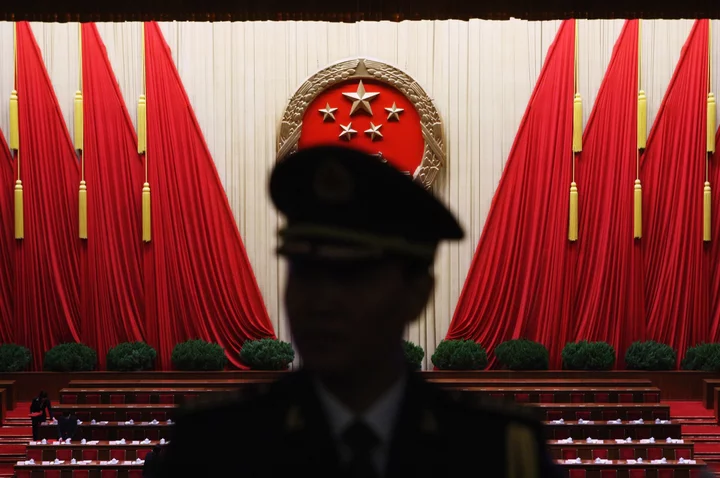China’s embrace of artificial intelligence for warfare has touched off alarm bells everywhere from Silicon Valley to the Pentagon.
Former Google Chief Executive Officer Eric Schmidt is among those raising concerns and is scheduled to testify in a House hearing about China Wednesday as head of an initiative that’s focused on speeding the US defense establishment’s adoption of AI. Schmidt’s Special Competitive Studies Project argues in a new report this month that the US needs to redesign its military to respond to the threat.
“China continues to amass a wide array of advanced capabilities designed specifically to counter the traditional American way of warfighting,” according to the report. It describes a 30-year effort by China to study US combat operations with the aim of being able to puncture its military might, now with the help of AI. It argues that a military’s ability to use AI faster than its enemy will be key to its strength.
Ylber Bajraktari, one of the report’s authors, told Bloomberg News it’s aimed at conveying to the Defense Department, Congress and the public the urgency of accelerating efforts to develop an AI-enabled US military force. But such efforts have sparked concerns of an AI arms race that could ultimately aggravate any conflict between the US and China.
Some US tech titans, including Tesla Inc. Chief Executive Officer Elon Musk, have called for a pause in developing artificial intelligence for military use over growing ethical concerns about its dangerous potential, even though US military leaders have pledged to stop short of letting autonomous weapons choose human targets on their own. That’s in keeping with growing concern over civilian uses of AI, including from some of the tech executives developing new products that can both provide cogent answers to questions and spread disinformation and deep-fake imagery.
When Altman Went to Washington and Asked for AI Rules: Takeaways
Still, many officials at the Pentagon and in Congress argue that if the US doesn’t develop powerful AI-powered weapons quickly, it will risk losing a potential future conflict with China.
US defense officials have eyed China’s ambitions in artificial intelligence especially warily since 2017, when China revealed its plan to become the global leader by 2030. In 2019, China rolled out a new military concept to bake AI into every part of its warfare operations. The Pentagon started its own efforts to develop and deploy AI for battle scenarios in 2017.
US defense experts worry about the potential crossing of red lines — such as AI-enabled attacks against satellites in space and nuclear architecture — and that the risk of rapid escalation remains underexplored by the US and China given the current climate of hostility.
Gregory Allen, who left his job as director of strategy and policy at the Pentagon’s Joint Artificial Intelligence Center last year, where his role included efforts to accelerate the US military’s adoption of AI, recalled multiple attempts by US defense officials to hold what he calls “military AI risk-reduction dialogues” with Chinese counterparts. Not a single outreach worked, he said.
“China has refused all overtures for conversations on military AI,” Allen said of the breakdown in military diplomacy between the two countries. “That’s a really tragic situation.”
The Chinese embassy in Washington didn’t respond to a request for comment.
Trying to rein in China’s AI ambitions, the Biden administration imposed export controls in October intended to prevent the sale of high-end chips to entities operating in China, including the military. The White House is also working on a measure to require a review of outbound investment in certain industries, especially emerging technologies like AI and quantum computing. The Defense Department has asked for $1.8 billion for AI in the 2024 budget, an increase from past years.
Kathleen Hicks, deputy defense secretary, said in a statement that such funding “will probably grow over time as we incorporate the technology effectively into how we operate.”
“Artificial intelligence is one of the vanguard technologies of our time, so of course we see the PRC trying to advance and exploit it,” she said. She added that the Defense Department is “making sure America continues to come out ahead” by embedding AI in many more aspects of its mission, including battlespace awareness, cyber, reconnaissance, logistics and force support. She said the US is committed to its responsible use.
‘Feeble’ Commitments
Such ambitions for – and investment in – autonomous warfare alarms United Nations Secretary-General Antonio Guterres and civil society groups such as the Campaign to Stop Killer Robots, an influential coalition of more than 180 member organizations including Amnesty International and Human Rights Watch. The coalition argues for a new international law on autonomy in weapons systems and decries US ethics commitments on responsible military use of AI thus far as “feeble.”
Not everyone is as sure as Hicks that the US is ahead in the military AI race. Representative Mike Gallagher, the Wisconsin Republican who chairs the House Select Committee on the Chinese Communist Party, told Bloomberg the US is “neck-and-neck” with China on AI, which he described as a critical technology that could determine geopolitical dominance this century. He wants to cut off the flow of American capital to Chinese AI companies.
The Australian Strategic Policy Institute, a think tank focused on national security, declared in March that China was ahead in 37 of 44 critical technologies, including artificial intelligence. While it deemed the US ahead in natural language processing, it found China is leading on AI algorithms and machine learning, including neural networks and deep learning.
Amid intense rivalry, some in Silicon Valley disapprove of the language of an AI “arms race.” Sarah Shoker, a research scientist who leads OpenAI’s geopolitics policy research team, told a summit on modern conflict at Vanderbilt University this month that she worries the term erroneously conflates economic competition with defense and international security and could cause panic and fear-mongering.
Bajraktari argues that fears about military use of AI are prescient. However, he said competition with China “is not going away.”
“It’s going to be enduring, it’s going to be exhausting, and likely existential,” he said.









